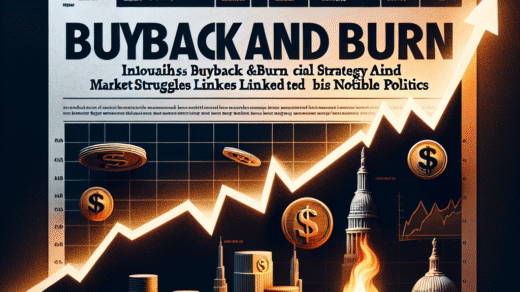U.S. Recession Fears Surge: How Tariffs Impact Bitcoin and Cryptocurrency Markets
The economic landscape in the United States is shifting dramatically as recession fears loom large following President Donald Trump’s recent tariff plan. This development has sent shockwaves through financial markets and cryptocurrency traders alike, leading to heightened speculation about the potential implications for Bitcoin (BTC) and other digital currencies. In this article, we will explore the surge in recession odds, the responses from prediction markets, and the possible outcomes for Bitcoin and the broader cryptocurrency ecosystem.
Prediction Markets Reflect Rising Recession Odds
Prediction platforms such as Polymarket and Kalshi are indicating that U.S. recession fears are escalating. On Polymarket, the likelihood of the U.S. slipping into recession this year has surged past 50% for the first time since the “US Recession in 2025” betting contract began trading earlier this year. The shares for a recession confirmation soared from 39 cents to over 50 cents in less than 24 hours. This contract will resolve to “Yes” if the National Bureau of Economic Research (NBER) confirms a recession before December 31, contingent on back-to-back quarterly contractions in gross domestic product (GDP).
Similarly, Kalshi, a regulated prediction market in the U.S., has reported a rise in traders’ concerns, with the probability of a recession in 2025 increasing from 40% to 54%. Such predictions often foreshadow market movements, particularly for risk assets like Bitcoin and cryptocurrencies.
Financial Markets React to Economic Uncertainty
With the S&P 500 futures trading 3% lower, it’s clear that financial markets are bracing for potential economic fallout. This bearish sentiment is also reflected in the cryptocurrency market, with Bitcoin trading at $83,100, down 1.5% within 24 hours. The recent tariff announcement from the Trump administration has set a base rate of 10% on all imports, with higher taxes imposed on 60 nations deemed the worst offenders. Notably, China has been hit the hardest with a staggering 34% levy added to the existing 20% charge, bringing the total to 54%.
The Short-Term Impact of Tariffs on Inflation and Market Stability
While the Trump administration anticipates that these tariffs will help rectify the persistent U.S. goods trade deficits, the immediate consequences could lead to increased domestic inflation and global instability. The threat of retaliation from countries like China and members of the European Union could initiate a full-blown global trade war, further complicating the economic landscape.
Are We Heading for a Full-Blown Recession?
Despite the prevailing fears, some analysts believe that the uncertainty surrounding tariffs may lead to only a temporary economic slowdown rather than a full-blown recession. UBS, for example, has expressed in a blog post that while the threat of further tariff escalation is concerning, their economic forecasts do not predict a recession in the U.S. They suggest that selective tariffs and counteractions may lead to slower economic growth compared to last year but should still allow for an expansion of around 2% in line with historical trends.
Market Sentiment: Dovish Tariffs and Future Rate Cuts
Financial analysts argue that the tariffs could have a dovish effect on the economy. Joseph Wang, operator of the research portal fedguy.com, remarked on social media that significant tariffs could lead to more Federal Reserve interest-rate cuts. He argues that while tariffs may initially lead to inflationary pressures, these effects could be mitigated through foreign-exchange rates, making them ultimately transitory.
Market participants are already pricing in a higher probability that the Federal Reserve will cut benchmark borrowing costs as early as June, potentially restarting the easing cycle that began in September last year. This anticipated shift in monetary policy could provide some relief to risk assets, including cryptocurrencies.
Bitcoin’s Role in a Turbulent Economic Environment
As recession fears mount and financial markets exhibit increased volatility, Bitcoin’s role as a potential safe haven asset is coming into question. Historically, Bitcoin has been viewed as a hedge against inflation and economic instability. However, with the current bearish market sentiment, traders are left to wonder how Bitcoin will perform amid rising recession odds and heightened economic uncertainty.
The Future of Cryptocurrency Amid Economic Challenges
As the situation unfolds, investors in Bitcoin and other cryptocurrencies must stay vigilant. The current economic climate presents both challenges and opportunities. With elevated recession odds, cryptocurrencies may experience significant fluctuations in value. However, savvy investors who understand the market dynamics and are prepared for volatility may find opportunities to capitalize on price movements.
Conclusion: Navigating the Intersection of Tariffs and Cryptocurrency
In conclusion, the surge in recession fears triggered by President Trump’s tariff plan has created a complex landscape for Bitcoin and the broader cryptocurrency market. As prediction markets adjust to the new economic realities, traders must remain informed and adaptable. The interplay between tariffs, inflation, and monetary policy will ultimately shape the trajectory of financial markets, including cryptocurrencies.
For those looking to invest in Bitcoin, understanding these economic indicators is crucial. If you’re new to cryptocurrency, consider exploring our guides on how to buy Bitcoin, how to buy cryptocurrency, and other digital assets. Staying informed will empower you to make strategic investment decisions in an ever-evolving market.
As we navigate these turbulent economic waters, it remains to be seen how Bitcoin and other cryptocurrencies will respond. One thing is certain: the intersection of economic policy, market sentiment, and digital currencies will continue to evolve, providing both challenges and opportunities for investors.







